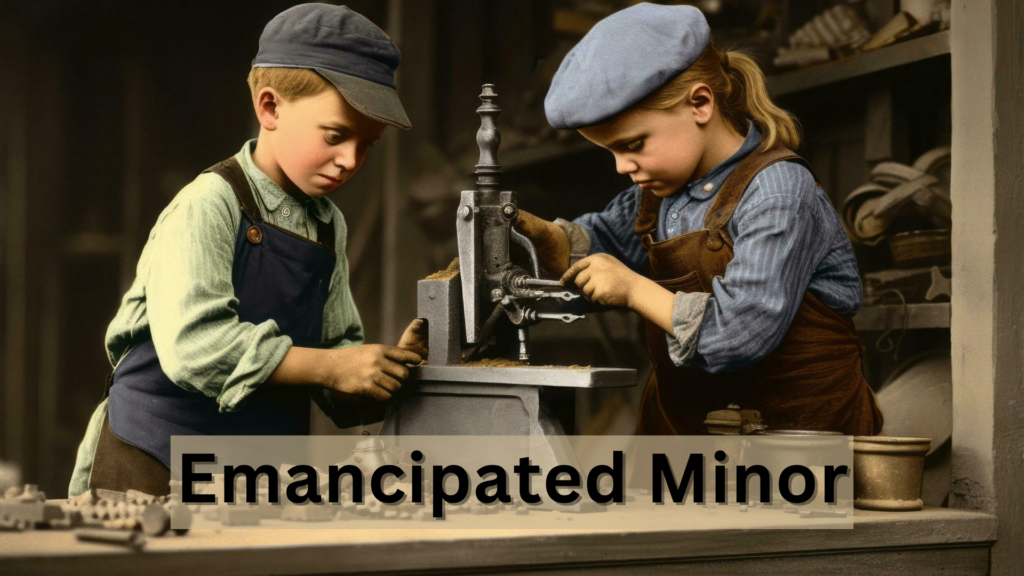Introduction
Becoming an emancipated minor is a significant legal transition that allows a young person to gain independence from their parents or guardians before reaching the age of majority. This process, which can vary by state, grants minors adult-like rights and responsibilities, profoundly affecting their legal status and daily life.
Understanding the journey to emancipation, its implications, and the steps involved can help those seeking autonomy or those supporting a minor through the process. This blog will explore what it means to be an emancipated minor, the legal steps required, and the real-life impact of this critical legal status.
What is an Emancipated Minor?
Definition of Emancipated Minor
An emancipated minor is a person under 18 who has legally gained the rights and responsibilities of adulthood. This means they can make decisions typically reserved for adults, such as entering into contracts, making medical decisions, and living independently. Emancipation is often sought by minors who wish to escape an unsuitable living situation or who need to take on adult responsibilities due to personal circumstances.
Legal Status and Rights
Emancipated minors have the legal authority to make decisions for themselves, which includes managing their finances, making educational choices, and consenting to medical treatment. However, the specifics of what rights are granted can vary depending on state laws.
Legal Steps to Emancipation
Eligibility Requirements
To pursue emancipation, a minor must meet specific criteria. Typically, these include:
- Age: Most states require the minor to be at least 16 years old.
- Self-Sufficiency: The minor must demonstrate the ability to support themselves financially.
- Living Situation: The minor usually must show they live independently or have a stable living situation outside their parental home.
Filing for Emancipation
The process of seeking emancipation generally involves the following steps:
- Petitioning the Court: The minor must file a petition with the family court in their jurisdiction. This petition outlines their reasons for seeking emancipation and includes evidence of their ability to live independently.
- Court Hearing: A court hearing is planned where the minor must present their case. This may involve testimony from the minor, parents, and other relevant parties.
- Judge’s Decision: The judge will decide whether to grant emancipation based on the evidence presented. The minor will get a court order attesting to their emancipation if approved.
Real-Life Impact of Emancipation
Independence and Responsibilities
Once emancipated, minors gain several new rights and responsibilities:
- Financial Independence: The financial duties of emancipated minors include managing income, paying bills, and handling taxes.
- Educational and Employment Decisions: They can make their own decisions regarding education and employment without parental consent.
- Medical Decisions: They can make their own medical decisions, including consent to treatment and managing healthcare.
Challenges Faced by Emancipated Minors
While emancipation provides independence, it also comes with challenges:
- Financial Strain: Managing finances can be complicated without parental support, especially if the minor is still in school or just starting out in the workforce.
- Social and Emotional Issues: Emancipated minors might face social and emotional challenges, including isolation from peers who have not experienced similar responsibilities.
Local Focus: Emancipation Laws and Resources
State-Specific Laws
The process and requirements for emancipation can vary significantly by state. For example:
- California: Minors must be at least 14 years old and demonstrate financial independence. The court will consider factors such as the minor’s maturity and ability to manage their own affairs.
- Texas: Minors must be at least 16 years old and show they are capable of self-support. Texas also requires the minor to be living separately from their parents.
Local Resources and Support
In many communities, local resources can assist minors in the emancipation process:
- Legal Aid Organizations: These organizations can provide guidance and support for minors seeking emancipation, often offering free or low-cost legal assistance.
- Youth Shelters and Counseling Services: These services can help minors navigate the challenges of independence and provide support in finding stable housing and employment.
Unique Insights on Emancipation
Impact on Family Dynamics
Emancipation can alter family dynamics, often creating tension between the minor and their parents. It’s essential for both parties to understand the implications and to seek counseling if needed to address any emotional or relational issues.
Future Implications
Emancipated minors may face unique challenges as they transition into adulthood. For example, they might encounter difficulties accessing certain benefits or services typically available to minors who remain under parental care.
Conclusion
Emancipation is a complex legal process granting minors independence and responsibility. By understanding the legal steps involved and the real-life impact of becoming an emancipated minor, individuals can better navigate this transition and make informed decisions. Whether you are a minor considering emancipation or someone supporting a young person through this journey, seeking appropriate legal guidance and support is crucial to ensure a prosperous and stable path to independence.
For more information or assistance with the emancipation process, consult a legal expert or local advocacy organization to get your needed support. Emancipation can be a decisive step toward independence but requires careful consideration and preparation.
FAQs
What are the main reasons minors seek emancipation?
Minors often seek emancipation due to challenging home environments, such as abuse or neglect, or because they need to take on adult responsibilities due to family circumstances.
Can a minor reverse their emancipation status?
In most cases, once a minor is emancipated, it is permanent. However, some jurisdictions may allow a petition to terminate the emancipation if circumstances change significantly.
How does emancipation affect a minor’s education?
Emancipated minors can make their own educational decisions, including enrolling in school, choosing classes, and applying for financial aid.
What financial responsibilities do emancipated minors have?
Emancipated minors are responsible for all their own financial needs, including housing, food, healthcare, and other living expenses. They must also handle their own taxes and financial management.
Are there any specific programs for emancipated minors?
Some states and local communities offer programs to support emancipated minors, including housing assistance, educational programs, and job placement services.





This web-based service enables instant conversion of images into JPG format, supporting common types such as JPG. All operations take place within the browser, with no need for app downloads or user accounts. Up to 20 files can be converted in a single session, improving efficiency for repetitive or large-scale tasks. Once files are processed, they are deleted from the system to maintain privacy and prevent unnecessary storage. JPEGtoJPGHERO is designed to work across all devices and browser types, offering a seamless experience whether on a computer, phone, or tablet. Its minimal layout emphasizes clarity and speed, guiding users directly to results. From resizing visuals for websites to preparing files for cloud storage, the platform handles JPEGtoJPGhero conversion with accuracy and ease. Its emphasis on simplicity and security makes it an excellent choice for both casual users and professionals who require consistent, reliable output.
https://instantencore.com/pac/reviews/review.aspx?PId=5125061&TopicId=1027405
температура воды в хургаде в апреле
як стати вебкам моделлю в Польщі Стань вебкам моделью в польской студии, работающей в Варшаве! Открыты вакансии для девушек в Польше, особенно для тех, кто говорит по-русски. Ищешь способ заработать онлайн в Польше? Предлагаем подработку для девушек в Варшаве с возможностью работы в интернете, даже с проживанием. Рассматриваешь удаленную работу в Польше? Узнай, как стать вебкам моделью и сколько можно заработать. Работа для украинок в Варшаве и высокооплачиваемые возможности для девушек в Польше ждут тебя. Мы предлагаем легальную вебкам работу в Польше, онлайн работа без необходимости знания польского языка. Приглашаем девушек без опыта в Варшаве в нашу вебкам студию с обучением. Возможность заработка в интернете без вложений. Работа моделью онлайн в Польше — это шанс для тебя! Ищешь “praca dla dziewczyn online”, “praca webcam Polska”, “praca modelka online” или “zarabianie przez internet dla kobiet”? Наше “agencja webcam Warszawa” и “webcam studio Polska” предлагают “praca dla mlodych kobiet Warszawa” и “legalna praca online Polska”. Смотри “oferty pracy dla Ukrainek w Polsce” и “praca z domu dla dziewczyn”.
кайтсёрфинг
Simply want to say your article is as amazing. The clearness in your post is just excellent and i can assume you are an expert on this subject. Fine with your permission allow me to grab your feed to keep updated with forthcoming post. Thanks a million and please keep up the gratifying work.
Child Porn
difference between hgh and testosterone
References:
anadrol vs hgh – clashofcryptos.trade,
dianabol steroid cycle
References:
anavar and dianabol cycle – https://F1news.space/item/403424,
hgh how many iu’s per day
References:
2 Iu Hgh Per Day Results – https://Images.Google.Co.Za/Url?Q=Https://Wehrle.De/Wp-Content/Pgs/Hgh_Kaufen_2.Html,
hgh vor oder nach dem essen
References:
hgh kur dosierung [realhire.co]
is creatine like steroids
References:
pro anabolic steroids